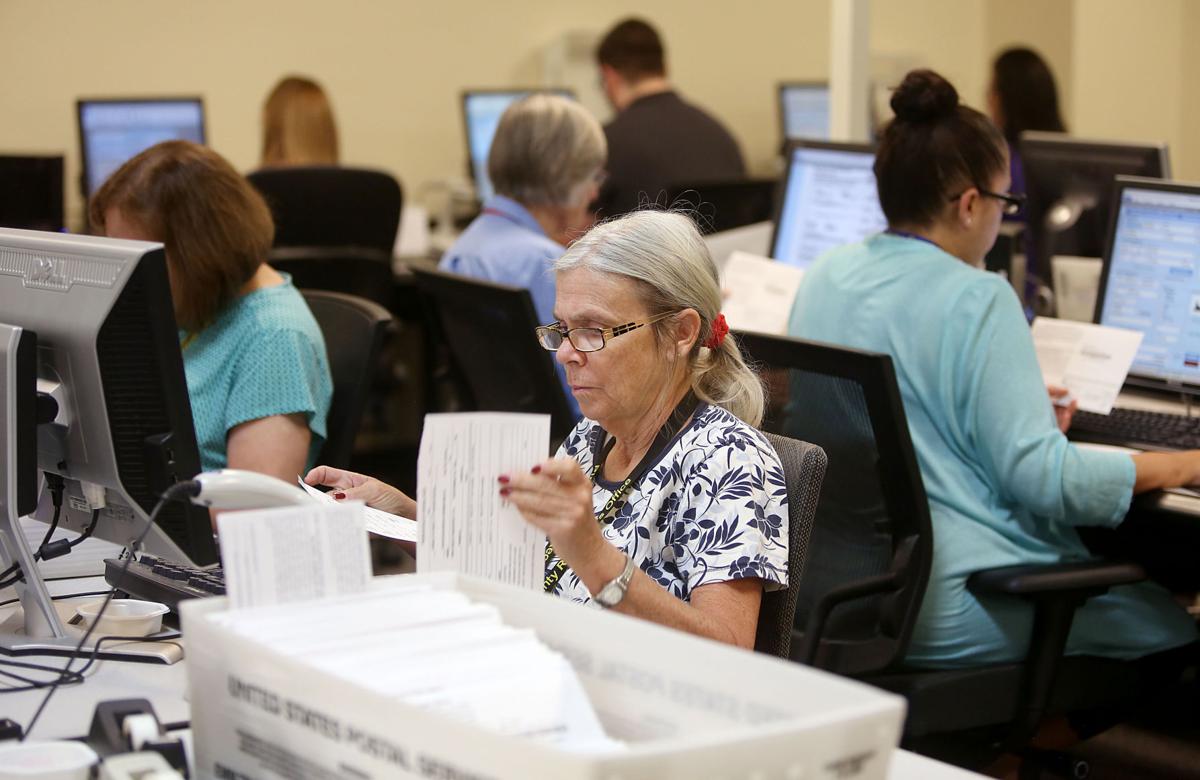A plan to funnel $3.5 billion into Arizona’s schools as part of a lawsuit settlement was too close to call Tuesday night, though early results showed a slight lead.
The opposition had a stronger voice than demonstrated by its committee’s fundraising power, which drew in about $16,000, according to state Treasurer Jeff DeWit, compared with the supporters’ $5 million.
As of late Tuesday night, the proposition led by 7,735 votes out of 917,159 tallied, a 50.4-49.6 percent margin, with counting to continue Wednesday statewide.
In Pima County, more voters were choosing to say “no.” Some 82,000 county voters supported the measure while nearly 95,000 opposed it, a 54-46 percent margin against the proposition, early results showed.
“We never thought this was going to be a slam dunk,” Gov. Doug Ducey, the prime architect of the measure, said earlier. Ducey didn’t comment Tuesday night on the early results.
Election officials said they might not know the outcome until at least Thursday or Friday, the Arizona Republic reported. At least 188,000 early ballots remained uncounted.
The purpose behind Proposition 123 was to end a lawsuit filed in 2010 after lawmakers and then-Gov. Jan Brewer, in a budget-balancing maneuver, ignored a 2000 voter-approved mandate to boost state aid to schools annually to account for inflation.
Morgan Abraham, chairman of the Vote No on Prop. 123 committee, said Tuesday night that he was encouraged by the close margin.
“It shows that money can’t buy elections,” he said, referring to the “yes” committee’s raising of millions. “And it also shows that Prop. 123 is clearly not a good idea for Arizona,” because it would only partially reimburse schools and would dip into the state land trust.
The measure’s failure, should that happen, would be a “hard pill to swallow,” said Jason Freed, president of the Tucson Education Association.
By voting “no,” “I think people would be intending to say this isn’t the way that they want to see the increased funding come,” Freed said. “The challenge is that there is no likely avenue that exists outside of Proposition 123 to bring money into education and certainly nothing that is going to do it immediately.”
Andrew Morrill, president of the Arizona Education Association, acknowledged Prop. 123 was crafted to give schools less than they might otherwise have gotten a court to award. But he said this was a sure thing.
“After four years of litigation that produced no money to schools, and knowing that the Legislature is the body that according to the constitution that appropriates funds, it made sense to secure this immediate funding relief,” he said.
Tucson Unified School District, the largest district in Pima County, planned to use its share of the funding to increase salaries of teachers and other staffers who support students, said Superintendent H.T. Sanchez.
While Sanchez calls Prop. 123 a good first step, he acknowledged on Tuesday that he was torn because voters already voted in 2000 and the Legislature ignored them. “The voters need to hold them accountable going into the next election cycle if they renege on their word to abide by Prop. 123,” Sanchez said.
Minimally, TUSD teachers would see a $500 increase next school year while others would receive 1 percent if the measure passes.
Catalina Foothills School District’s teachers would feel the impact of the proposition immediately with a 4.59 percent increase in salary, should it pass. A first-year teacher’s salary would go from $36,000 to $38,500.
“We believe that unless we pay our faculty more, we can’t slow that loss of experienced teachers and promising new teacher applicants to other states,” said Mary Kamerzell, Catalina Foothills’ superintendent. “Our Arizona teacher shortage is a real and growing concern.”
There were reasons for voter skepticism. DeWit, backed by former treasurers, said it was wrong to use money in a special education trust fund account — money already set aside legally for schools — to settle a lawsuit over the failure of lawmakers and the prior governor to meet their legal obligation to increase basic state aid as voters mandated.
He also said the additional $2.1 billion in withdrawals from the trust over the next decade would undermine the purpose of Congress giving 10 million acres of land to the state in 1912 to set up a permanent trust.
Morrill, however, said there was “a misinformation campaign that confused an already complex issue.” He did say there were reasons voters might have been concerned, citing “triggers” in the measure.
One says if state aid to schools reaches 49 percent of the state budget, lawmakers could refuse to provide inflation increases; at 50 percent the Legislature could actually reduce state aid. Schools currently make up about 42 percent of state spending.





